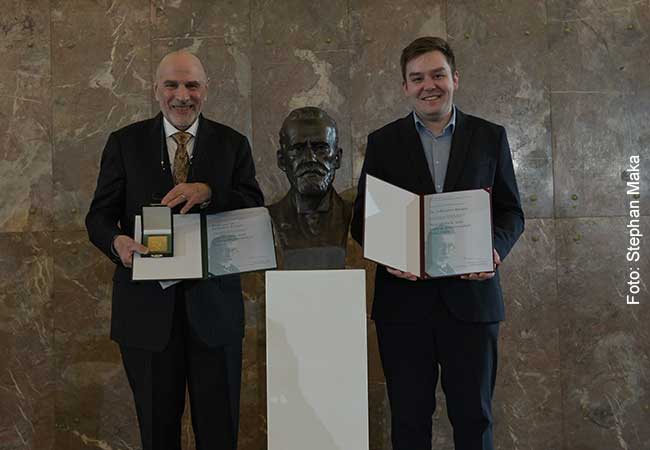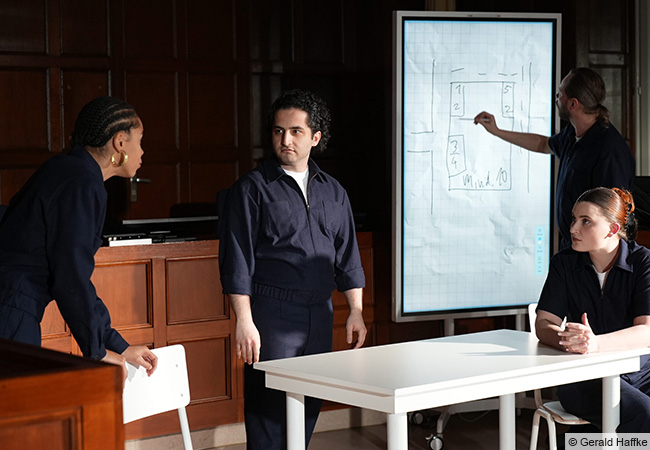This year’s Paul Ehrlich and Ludwig Darmstaedter Prizes will be awarded at Paulskirche in Frankfurt today
Physician and immunologist Dennis L. Kasper (81) of Harvard Medical School will receive the Paul Ehrlich and Ludwig Darmstaedter Prize 2024, endowed with €120,000, in a ceremony held in Frankfurt’s Paulskirche today. The award recognizes his discovery of the first words of the biochemical language through which bacteria that populate our colon educate our immune system, thereby ensuring its healthy development. The Early Career Award goes to chemist Johannes Karges (31) from Ruhr University Bochum for his invention of a process with which highly effective chemotherapeutic agents can only accumulate in the tumor and can only be activated there by irradiation with light or ultrasound.
Around ten trillion bacteria live in the large intestine of every human being, which, for the most part, act as guarantors of our health. This is because over the course of evolution, relationships have developed between bacteria and their hosts from which both benefit. In return for finding an ideal habitat in the gut, the bacteria defend us against their pathogenic relatives, provide us with vitamins and nutrients or help us with digestion. This symbiosis can only succeed through continuous communication between our intestinal bacteria and our immune system. Dennis L. Kasper has decoded the first words and rules of the language in which this communication takes place. He discovered that certain bacterial molecules act as educators of the immune system and teach it not to attack useful bacteria or cells of its own body, i.e. to maintain a healthy balance between tolerance and aggression. „Dennis Kasper is the first person to succeed in uncovering communication channels in the superorganism formed by humans and their microbiome,“ explains, Prof. Dr. Thomas Boehm, Chairman of the Scientific Council of the Paul Ehrlich Foundation. „In doing so, he has opened the door to a field of research in which new approaches for the treatment of autoimmune diseases are already emerging.“
Cisplatin and two of its derivatives are the world’s most common cancer drugs. While they show impressive success against certain types of cancer, at the same time, they quickly bring about resistance. In addition, given that they also inhibit the division of healthy body cells, they cause serious side effects. The winner of this year’s Paul Ehrlich and Ludwig Darmstaedter Early Career Award, Johannes Karges, has developed a process that allows platinum-containing drugs to act exclusively in the tumor. To do so, he packages them in nanoparticles that only accumulate in the cancer tissue, where they are then activated by external irradiation with light or ultrasound. In this way, he can precisely control the use of certain cytostatic drugs in terms of both space and time – like remote-controlled magic bullets that, in the spirit of Paul Ehrlich, selectively cure the disease without harming the rest of the body. The prizewinner has already provided preclinical proof of his concept, whose translation into clinical practice could significantly increase both the efficacy and tolerability of many chemotherapies.

Paul Ehrlich and Ludwig Darmstaedter Prize 2024 https://tinygu.de/5UkpI
Dennis L. Kasper has been William Ellery Channing Professor of Medicine since 1989 and Professor of Immunology at Harvard Medical School since 1997. He is co-editor of Harrison’s Principles of Internal Medicine (currently in its 22nd edition), the world’s most widely used medical textbook, of which he was editor-in-chief for the 16th and 19th editions. https://kasperlab.hms.harvard.edu/
Paul Ehrlich and Ludwig Darmstaedter Early Career Award 2024 https://tinygu.de/jiiHJ
Johannes Karges studied chemistry in Marburg and London and conducted research as a doctoral student in Paris and Guangzhou. As a postdoctoral researcher, he worked at the University of California, San Diego, in La Jolla. Since November 2022, he has headed a research group at Ruhr University Bochum as a Liebig Fellow of the Chemical Industry Fund. https://www.kargesgroup.ruhr-uni-bochum.de/







